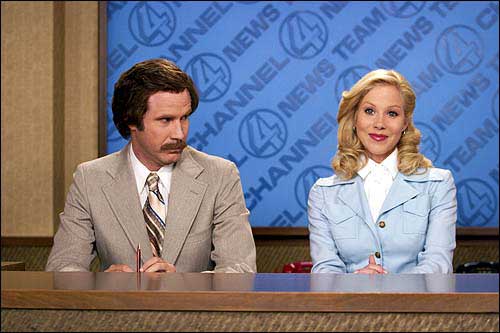This just in: ‘Anchorman’ funny, uneven
During rather hilarious outtakes that run over the closing credits of “Anchorman: The Legend of Ron Burgundy,” star Will Ferrell is seen improvising take after take of the same scene. Each time he comes up with a different off-the-wall phrase to punctuate his dialog.
The sequence is emblematic of the whole film. The comedy seems like it was structured with the most bare bones idea of a plot and characters, then the rest was improvised by the talented actors.
Frequently, this leads to side-splitting moments of quirky humor. But overall “Anchorman” feels like a bunch of funny bits inserted into an uneven movie that ultimately can’t sustain a viewer’s interest.
It’s like half the cast is making “Old School” and the other is striving for “Airplane!”
Something to consider: There are at least five scenes shown in the film’s brief trailer that aren’t in the actual release. Some of these allude to a totally different finale (Christina Applegate: “You took a bullet for me?” Ferrell: “And I would not do that again. It hurts like a mother!”)
While this is hardly a sin, it does indicate how unfocused the movie comes across. When the filmmakers’ best trailer footage ends up on the cutting-room floor, it’s a sign that the project may be suffering an identity crisis.
Which is exactly what happens to Ron Burgundy.
Ferrell plays the title character, a vain anchor of an affiliate station in San Diego in the mid-1970s. Flanked by his admiring peers — a hipster on-the-street reporter (Paul Rudd), a redneck sports guy (David Koechner) and a dim weatherman (Steven Carell) — the group rules the local airwaves. That is until an ambitious female reporter (Applegate) enters the scene.
Ferrell: “What are your hopes? What are your dreams? What are your passions?”

Will Ferrell stars as an old-school newsman in the 1970s coping with change in the comedy Anchorman:
Applegate: “To be the first female anchor.”
Ferrell: “And I’d like to be King of Australia. Seriously, you sound like an insane person.”
Oh wait, that exchange is only in the trailer not the movie.
Her presence causes resentment among the males at the station. Yet Ron begins to fall for the blonde, which leads to even more hassles.
Writer-director Adam McCay and co-writer Ferrell can’t quite hide the curse of their “Saturday Night Live” pedigree. Although great in small doses, “Anchorman” struggles to sustain its concept through feature length.
The pair tries to compensate by throwing virtually anything at the screen: animated sequences, multiple narrators, breaking the “fourth wall.” Sometimes the weirdness is inspired, as in a club scene in which Ferrell regales the audience with his “jazz flute.”
Other times it’s a total misfire. A brawl between anchors from rival stations ends up as ridiculous as a Monty Python sketch, complete with limbs being hacked off for comedic effect. Of all the sequences, this one seems to fit the least.
Making the movie even more distracting is the reliance upon cameos from Ferrell’s past cinematic pals that add nothing other than a “Look, it’s (blank)” factor.
The principal actors certainly fare better than these throwaway appearances. The manic Ferrell radiates pure unctuous condescension with his porn-star mustache and garish wardrobe of “suits so fine they make Sinatra look like a hobo.” The towering comedian is often brilliant in his over-the-top diatribes. Sometimes he’s just over-the-top.
Equally prominent is Carell (“Bruce Almighty”). There’s a real art to portraying a dumb guy, and his character Brick Tamland is definitely one brick short of a full load. It’s revealed early on that he only has an IQ in the 40s. But for the job of a network weatherman, this mental acuity works as a career advantage.

Will Ferrell, left, portrays a popular San Diego newsman who is forced into sharing the spotlight with a young female reporter in Anchorman:
And Kansas University standout Rudd does his best to give his roving reporter a Me-Decade swarthiness that rivals Ferrell. It’s good to see the frequently cast “nice guy” playing against type.
These performances at least provide some unity to the undeveloped ideas and overall disjointed quality of the picture.
As Rudd’s sleazy reporter says when discussing his special cologne’s power over women, “Sixty percent of the time it works every time.”
That’s about the same ratio of jokes to actual laughs in “Anchorman.”




